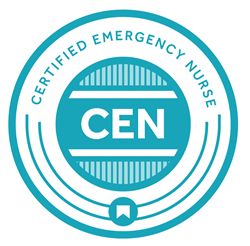
The CEN credential is a mark of excellence for RNs working in the ED and other emergency settings.
“ABSNC reaccreditation is important to nurses, patients and their families, and healthcare organizations because it independently validates that the Certified Emergency Nurse continues to meet the very highest standards for nursing certification programs.”
OAK BROOK, Ill. (PRWEB)
September 16, 2021
The Board of Certification for Emergency Nursing (BCEN) today announced that its Certified Emergency Nurse (CEN) specialty nursing certification program has been reaccredited by the Accreditation Board for Specialty Nursing Certification (ABSNC).
Held by over 41,000 RNs worldwide, the CEN is one of the oldest and most widely held national nursing professional credentials. Nurses who earn and maintain the CEN have demonstrated they possess advanced knowledge and clinical judgment across the entire emergency nursing body of knowledge for patients of all ages.
“ABSNC reaccreditation is important to nurses, patients and their families, and healthcare organizations because it independently validates that the Certified Emergency Nurse continues to meet the very highest standards for nursing certification programs,” said BCEN CEO Janie Schumaker, MBA, RN, CEN, CENP, CPHQ, FABC.
“CEN-certified nurses demonstrate the highest level of commitment to emergency nursing clinical excellence and professionalism, and BCEN places the highest priority on maintaining the exceptionalism of the CEN program,” said BCEN Director of Certification and Accreditation Amy Grand, MSN, RN.
In a large-scale value of certification study, nurse supervisors said the following:
-
95% said the CEN is valuable to the emergency nursing profession. - 93% said it is important for emergency nurses to maintain their certification over time by recertifying.
- 92% said it is important to have CENs in their organization.
The CEN was initially accredited by ABSNC in 2002 and has been an ANCC Magnet-accepted certification program since 2009. For more on the impact and history of the CEN, read 40 Years of Excellence: The CEN.
ABSNC is the only accrediting body specifically dedicated to evaluating nursing certification programs. Read ABSNC’s announcement on the reaccreditation of the CEN program here: https://www.absnc.org/news/board-certification-emergency-nursing-receives-reaccreditation-certified-emergency-nurse
What is accreditation?
Accreditation provides an impartial third-party validation that a certification program has met recognized national industry standards for the development, implementation and maintenance of that program. ABSNC accreditation is a comprehensive and rigorous peer-review process whereby a nursing specialty certification body demonstrates that a particular certification program adheres to ABSNC’s 18 accreditation standards including organizational autonomy, basis in a body of research-based knowledge, nondiscrimination, test development, validity, reliability, test administration, test security, fairness of passing score, recertification, confidentiality, and appeals.
About BCEN
Founded in 1980, the independent, not-for-profit Board of Certification for Emergency Nursing (BCEN®) is celebrating 40 years of robust certification programs fostering empowered nurses across the emergency spectrum who contribute noticeably to patient care, safety and outcomes. Nearly 59,000 BCEN board certifications are currently held by registered nurses (RNs) who specialize in emergency, flight, critical care ground transport, pediatric emergency and trauma nursing. BCEN offers the Certified Emergency Nurse (CEN®), Certified Flight Registered Nurse (CFRN®), Certified Pediatric Emergency Nurse (CPEN®), Certified Transport Registered Nurse (CTRN®) and Trauma Certified Registered Nurse (TCRN®) certifications. The CEN, CFRN, CPEN, and TCRN certification programs are accredited by the Accreditation Board for Specialty Nursing Certification (ABSNC). Learn more at https://bcen.org. Follow BCEN on Facebook, LinkedIn and Instagram.
Share article on social media or email:

